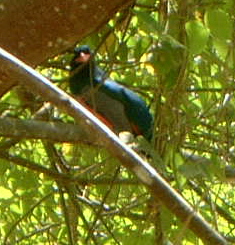ERROR : Server Busy(-1105)
ERROR : Server Busy(-1105)
Slaty-tailed Trogon (Trogon massena) - Wiki
Slaty-tailed Trogon
From Wikipedia, the free encyclopedia
[Photo] Male Slaty-tailed Trogon, Trogon massena, at Villa Lapas Costa Rica. February 2006 jimfbleak (http://en.wikipedia.org/wiki/User:Jimfbleak) | Permission is granted to copy, distribute and/or modify this document under the terms of the GNU Free Documentation License, Version 1.2 or any later version published by the Free Software Foundation; with no Invariant Sections, no Front-Cover Texts, and no Back-Cover Texts. A copy of the license is included in the section entitled "GNU Free Documentation License". |
The Slaty-tailed Trogon, Trogon massena, is a near passerine bird in the trogon family, Trogonidae. It breeds in lowlands from southeastern Mexico south through Central America, to Colombia, and a small region of northwestern Ecuador.
It is a resident of the canopy and higher levels of damp tropical forests, but comes lower in adjacent semi-open areas. It nests 3-15 m high in an occupied termite nest or decaying tree trunk, with a typical clutch of three white or bluish-white eggs laid in a chamber reached by an ascending tunnel. Both sexes excavate the nesting chamber.
Slaty-tailed Trogons feed on insects and fruit, and their broad bills and weak legs reflect their diet and arboreal habits. Although their flight is fast, they are reluctant to fly any distance. They typically perch upright and motionless.
Trogons have distinctive male and female plumages, with soft, often colourful, feathers. This species is about 30cm long and weighs 145 g. It has a uniformly dark grey tail, and the wing coverts also appear grey, although actually finely vermiculated in black and white. The male Slaty-tailed Trogon has a green back, head and breast, red belly and orange bill. The female has a dark grey back, head and breast, red belly and only partially orange bill, most of the upper mandible being black. The call is a nasal uk uk uk.
http://en.wikipedia.org/wiki/Slaty-tailed_Trogon
| The text in this page is based on the copyrighted Wikipedia article shown in above URL. It is used under the GNU Free Documentation License. You may redistribute it, verbatim or modified, providing that you comply with the terms of the GFDL. |
|

